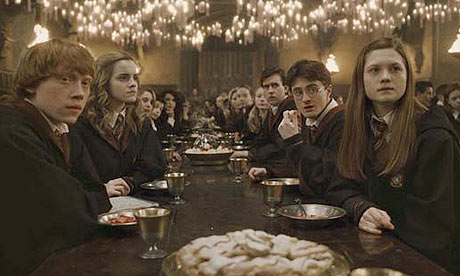
The latest cinematic helping of the Harry Potter saga brings us several weighty messages. It explains that there can be no light without the dark. That in troubled times it's important to be brave and strong. That the greatest weapon of dark forces is our own weakness. And that the monster within can be buried deep.
It also offers some slightly more useful lessons. That you should avoid people who speak to snakes. That potions classes are more important than quidditch practice. And that British acting's finest flowers are happy to make fools of themselves by lending their talents to drivel.
All the same, this isn't really enough from the year's most gargantuan cultural event to date. Director David Yates diverts us with amazing sets and effects, but his story's woefully feeble. As in previous episodes of the Potter series, the characterisation's crude, the dialogue leaden and the acting stilted. Such interest as cinema's sixth puffer-train pilgrimage to Hogwarts manages to generate concerns its hero's coming of age. Yet there's not much on offer for fans of high-school teen flicks. Here, the thrills, jealousies and sorrows of young love are as tepid as everything else.
In fact, the intimations of Harry's impending adulthood are vaguely disturbing. At his age, why's he still messing about with magic? Shouldn't he be doing something more grown-up, like getting his wand out for the ladies in a posh play? This prompts a further, even more worrying question. Why are the rest of us still so enthralled by the dumb doings of Dumbledore's doomy darlings?
Who cares, you may think: Harry Potter's only for kids. But he isn't. Cheek by jowl with the family parties in the endless box-office queues shuffle iPodded young couples, sturdy matrons and midlife-crisis males, all of them shamelessly unchaperoned by sprogs. At the exits afterwards, they can be heard bemoaning Yates's departures from Ms Rowling's sacred text. Without its capacity to bewitch the supposedly mature, the Potter franchise would never have established its unrivalled grip on the box office. The indications are that the average age of the audience has actually been rising as film follows film. Harry's greying aficionados are boastful rather than embarrassed about their affliction. Small wonder that Warner Bros was prepared to let Half-Blood Prince's two immediate predecessors pick up a PG-13. They knew that with so many prime-of-life patrons they could afford to risk losing a few youngsters.
Presumably, these grown-up fans of wizardry hanker for a second childhood. Yet Harry's world isn't even that of their own early years. It's some kind of meta-childhood, concocted from a witch's brew of prewar boarding-school bilge written for poor kids about rich kids, Dickensian nonsense and clapped-out fairytales. It's understandable enough that children should fancy escaping into such a universe, just as Harry did himself. Yet it may not be the best place for them. It's surely a still less suitable haven for their elders. These days, no one seems to want to grow up. Kidulthood in its many guises extends its baleful grip by the hour. Cinema has fed the process. This summer, not just wizards and death-eaters but transformers, terminators and vampires have dominated the big screen. Yet it's surely in the world of the muggles that the most urgent drama, enlightening ideas and fulfilling entertainment are to be found.
No matter. The most successful films of the next few years will doubtless be the two further epics to be squeezed by a grateful Hollywood out of Harry's final adventure. Presumably these will be even more repetitive than those we've already had. Still, children love being told their favourite bedtime story over and over again. Nowadays, it seems, their parents share this predilection.
We'll never know what worthier works will have been banished from the multiplexes by Harry's all-pervading spell. We can't stop him making his two further contributions to the infantilisation of the world. After that, however, if would be nice if cinemagoers could put aside childish things when the moment to do so arrives.

